- Home
- J. Edward Neill
Machina Obscurum Page 14
Machina Obscurum Read online
Page 14
The blind man spread his arms, palms upward, and lifted his useless eyes towards the blue above to commune with The Skyfire. Drav had seen the decision take anywhere from a few seconds to three days, but the outcome was always the same. Lo’s justice was always done.
Except once, many years ago.
Drav marked Creno Nar. He was on his knees, the cleric standing behind him. He did not make eye contact with the crowd but stared straight ahead, over their heads, at nothing. His face betrayed no signs of fear or regret. This surprised Drav little. Nar was what he was: a raper and murderer of children, and he was content with it. Even now, with his own death imminent, the corners of his mouth were upturned. He was a diseased and evil beast and the sooner he was delivered into the wrathful fires of Lo, the better.
Hunting and capturing villains like Creno Nar was the mission of the Gloomwalker. While the municipal constables patrolled the streets, settled disputes, and chased ordinary criminals, the ‘walkers dove deep into the darkest corners, hunting those whose crimes far surpassed theft and casual violence.
Drav Astia had been a Gloomwalker for ten years.
Five minutes passed, the quiet broken solely by the yammering child who rightly had no idea what was going on and why nobody was talking.
The Sightless reached behind his back and drew out his doru, a three-foot long spike of polished steel. It was not a pike, nor a sword, and would be useless against an armed opponent on the field of battle, but those who met the wrong end of them were never armed. They were only carried by the Sightless, and only drawn for occasions such as this.
The Sightless placed his left hand on the kneeling prisoner’s shoulder, steadying him and letting him know that the time had come, that Lo had leveled judgement, that death was coming.
The condemned took a deep, defiant breath. This was usually the moment, at the Touch of Judgment, where men unraveled, where they renounced their crimes and asked for forgiveness and mercy. But Creno Nar, fucker and slayer of children, clenched his teeth and waited for his end.
The Sightless placed the tip of the doru at the base of the man’s neck, lifted it high, and plunged it down into the exact spot he had measured. It slid into him as if he were made of grease. Blood shot a foot into the air, staining the executioner’s white robes. The dead man mustered one final hateful sneer, meant for the people watching him die, the man who had killed him, the Cyng, Lo Itself, and probably Drav Astia most of all. He toppled forward when the doru was removed from his neck.
Some in the crowd applauded. Others retched. Prayed. Wept.
Drav spat in the dirt. It was time to go home and try to get some sleep. In a few hours Lo would disappear behind the horizon and darkness would descend, and he was certain the night would be a busy one for him.
For Téssera had been in full gaze the night before and the artist’s Eye had become an ill and deadly omen for the people of ValleyHeart over the last three months.
He feared it would soon be four.
IT WAS THINGS LIKE THIS that made Pinque miss the inanity of his days in the army. After serving his mandatory year warding the frontier, the Far Coaster had reported to the Cyng’s Modorfyrd, sword at his belt, mail on his back, and adventure in his dreams. As a boy, standing knee-deep in tidal basins, pulling deep-rooted gooey mussels out of the silt with his prematurely calloused and salt-withered hands, he swore that one day he would be a soldier. He hadn’t wanted his father’s life; the toils of a shallows farmer were hardly worth the pittance brought in by each year’s unpredictable harvest.
But in a Cyngdom that hadn’t seen total war in ten generations, life in the standing ranks was dull and tedious. Pinque, like so many others, turned to other pursuits to hasten the days. He proved to be a shit boxer and a careless gambler, a combination detrimental to both his health and purse. When his debts reached unacceptable levels, he found himself one night surrounded by four men seeking payment in pain. As they beat him, he drew a small dirk from his boot and stuck it into the thigh of one of his assailants. How was he to tell an officer’s leg from any other?
The next day Pinque was purged from the ranks. The Cyng’s army was no place for men like him, he was told, although in reality men like him were the norm. He was to take his odious, degenerate vices elsewhere.
That elsewhere ended up being the ValleyHeart constabulary.
This night, though, what he wouldn’t have given to be back in camp, being pummeled half-dead by a Southern berserker for the chance at 15 marks. Or to be back in those tidal shallows alongside his father, who hit harder than the berserker, and with less control or sympathy.
“Are you sure he’s been summoned?” Pinque asked his randomly assigned partner, a portly Easterner named Flail.
“Aye, he’s be called fer,” the man answered. His accent was strong but had softened from living in the city for many years. Not long ago Pinque had served with a hard man who had grown up in the Eastmonts, a real Deep Hills mongrel. Half the time he had had no idea what the man was saying. One of many things that made the man infuriating. His accent made Flail sound like a Dinoran noble in contrast. “I sen’ the boy on min own hors. Reck’ they be returning wit soon quick haste.”
Pinque looked down at the body. At the whole of the crime. He was a stupid man, he had been told, but he knew what this meant. What he had stepped into. And he was eager to scrape it off the bottom of his boot.
“You ever seein’ a thin’ liken this one, Master Pinque?” Flail asked. “I’m meanin’, who’ver done this done this ‘un up like a hog or wilding buck.”
Like an animal. Pinque could not disagree.
“I thin’ I’ll lit up a lantern fer him fer when he gets here,” Flail said, trying to be useful.
“Don’t bother yourself,” Pinque replied.
“It’s like pitch t’night. The Eyes be hiding behind the clouds.”
“It’ll be a waste o’ oil.”
Flail headed back to the horses to grab a lantern and flint.
Pinque guessed the victim to be a hair shy of three score. He lay on his back, legs and arms akimbo. His face, gray-bearded and slim, was the pale white reserved for the dead, and his eyes were open, clouded over, their color faded forever. The chest was torn open as if it had exploded from the inside. The dried blood on and around the man looked black in the lantern light. An instrument had been used: a knife, a saw, something, but it had been used poorly. The incisions were made neither with confidence like a butcher nor precision like a surgeon. They were timid, jagged cuts, full of stops and starts, especially on the man’s right breast, where it seemed the operation had been aborted. The killer had been after the man’s heart but had begun digging in the wrong place.
His second attempt, however crude and inefficient, had been much more successful. Pinque could see into the bloody cavity where the man’s beating soul had once resided.
Had once. But no more.
A galloping horse came to a stop at the mouth of the alley. The rider was dressed entirely in shades of black and gray: boots, breeches, shirt, cape. His odd wide-brimmed floppy hat was the color of dying charcoal. He climbed down from the mare and stood easily a head higher than either constable.
Flail tried to hand the man a lantern but was paid no regard.
Pinque took a few steps towards the approaching man.
“Constable Astia,” he greeted.
“Hello, Pinque.” His voice was low and rough. “You know to call me Drav.”
Gloomwalkers, Pinque thought. They were all odd; they were all different. But Drav Astia was odder and differenter than the others.
Pinque motioned towards Flail. “This is— “
“I don’t care,” Drav said, not even casting his eyes on the fat man. “Show me.”
They lead the newcomer around the corner to where the victim lay.
“Turn down your lanterns,” the Gloomwalker said, quietly.
“I don’ understand.”
“Just do it, Flail,” Pinque said.
Both men extinguished their lights. Flail had been right. The Eyes and stars were hiding, leaving the sky like tar. Pinque stood quietly in the darkness, knowing that Astia was not at all hindered by it. It was common knowledge that all Gloomwalkers were gifted with nighteyes. Whether the gift was required to join the ranks or given to them by some unnatural means, Pinque did not know. He did know, however, that he had never known a ‘walker that needed a torch to find his way.
After a few minutes Flail complained. “I can’ see a thing.”
A few minutes more. “Wha’ is we doing here, Master Constable Walker Sir? I feel like a dirt merchan’ jus’ standing here seein’ an’ doin’ nothing.”
“Pinque,” came another voice in the dark. “If you do not quiet your charge, I will.”
“Snap it shut, Flail. Let the man work.”
“But I— “
“Snap it!”
Ten more minutes passed and Pinque started to lose his patience. He was about to say something when Astia said “You can light your torches again.”
Pinque fumbled for a moment in the dark with his flint, but he soon lit the wick and had his lantern burning. Drav was kneeling over the body, but his attention was riveted to the cracked wall above. On that wall, scrawled in thick lines of the dead man’s blood, were four words:
THE HEART WILL BURN
Astia took a deep breath and closed his eyes, rubbing them with the heels of his hands. “Constable Pinque, has anyone else seen this?”
“Just the whore who found him, but I don’t think she can read. It’s him, isn’t it?”
Three months ago there had been a body found in a similar place, an alleyway off Hoarfield Square, mutilated nearly identically to the one before them. The night before, Téssera, the Eye of Lo that watched over artists and craftsman, had been in full gaze. That victim, a merchant from Roseneedle, had his heart ripped out of his chest and his blood had been used to paint a message on the wall:
DEATH ON THE HORIZON, BACK TO THE GRAVE
An ominous statement that mocked the credo of the ValleyHeart’s wardens, who, from their frontier outposts, guarded the Cyngdom from outside threats. It had been several years since Pinque had left the frontier, but he would always remember the oath: “Eyes on the Horizon, Back to the ‘Heart”.
Word of the grisly crime spread quickly. In ten days, the Gloomwalker pursuing the case found a sickly beggar in Greenhall that he was sure was the murderer. The man resisted and was slain. It was over.
Until a month later when another man was killed, in the same way, again following Tésserans’ most sacred night. This time, the bloody missive was a bit more specific:
TWYTH SEES ALL
Twyth, the Ninth Eye, The Uncounted, the guardian of all things evil and fiendish. It had never been seen in the sky. There were many who doubted its existence. But not Pinque. He knew Twyth was out there, somewhere beyond Lo’s eight known sentinels. Past Augo, that watched the Cyng. Past Wrae, guardian of the outcast and downtrodden.
Lo doesn’t want us to see Twyth, Pinque believed. The Skyfire hides it from us to protect us.
Two similar murders, on the same day of the month, both with what seemed to be portents written in blood. They started calling the unknown killer “The Herald”.
Yet the third murder again happened under the watchful gaze of Téssera and the law.
Four words.
Sixteen letters.
BURIED BUT NOT GONE
It was at this point, after three lay dead, that Drav Astia, whom the Master of Order considered his most capable ‘walker, was assigned to find The Herald.
Three messages in three months.
And now, a fourth.
“‘The heart will burn’.” Pinque read. Despite the beliefs of many, Far Coasters could read. Some of them. “Maybe he had the fermented goat tail stew at The Grounded Galley. That’ll make more than your heart burn. Had to empty my chamber pot three times that sleep.”
Drav didn’t smile. Drav never smiled. “He’s not getting any better at this, is he?”
“He’s getting worse. He forgot what side the heart was on.”
They hadn’t yet found the missing organ. Pinque knew they wouldn’t.
“Who is he?” Drav asked, almost to himself.
“A bloody fien’,” Flail said, his input unwelcome. “Mus’ be some sort kind o’ demon o’ sorcerer o’ beast o’ the night, snarling like with claws an’ fangs.”
“I assure you, constable, that the perpetrator of the crime is a man like you or I.”
“No like I.”
Drav leveled a stern look at him. “A man like me then.”
Flail backed up a step. Astia frightened him. Astia frightened everyone.
He turned away from Flail. “Talk with me, Pinque, will you?” he asked.
Surprised, the Far Coaster didn’t get out a response before the man in black continued.
“Why these men?”
“Pardon?”
“The four men he has killed. Why them?”
“I’d be guessing they was in unfortunate places at mighty unfortunate times.”
“Children or smaller women would be easier prey than most men, would they not, if his only care is to deliver his diseased messages?” Astia asked.
“Not one of them was from here or anywhere east of HeartStone. Westsiders, all of ‘em. Moneyed men of standing.”
“Yet each one before was found with purse untouched. I assume this one as well.”
“Aye.”
“Hand it over, then.”
“Ah, Drav— “
“Pinque. We are not looters.”
Pinque handed over the dead man’s heavy coin purse. He felt lighter and poorer without it.
“The men he chooses are all small in stature, advanced in age,” Drav continued. “Harder to kill than a child, easier than a healthy young man or even a strong-willed woman. And he strikes only when Téssera is at full gaze.”
“He’s an artisan of some kind?”
“Or wants us to believe that he is. Let’s not arrest every poet and potter in the Valley quite yet. So what is his mission, constable? He has an end in mind. He must.”
“He thinks he’s trying to warn us.”
“But about what?”
“By Twyth’s gaze, I have no idea. He is diseased, Drav. Mad. Whatever made-up spook stories his crazed mind is telling him. That’s what he’s telling us.”
“Perhaps. But his cries are loud and we cannot stop until they quiet.”
“If he’s trying to speak to us, then why down here out of sight?” Pinque asked. “Why not somewhere public? Nail them up in the forum like the Cyng used to do with killers, rapers, and traitors.”
The ‘walker thought for a moment. “He doesn’t want everyone to see what he has done. He can’t bear it. He doesn’t want to do this; he must. So he tucks them away, not hidden, but barely out of sight, knowing that someone will find what he has done and summon us. We are his audience.”
“You and me?”
“You and me and that fat bastard over there and the Captains, all the way up to the Master of Order. The Choir. All the way to HeartStone.”
“These are messages for the Cyng?”
“We see for him. Listen for him. We observe this Cyngdom on his behalf. We are but an extension of our liege’s senses.”
They stood in silence for a full minute. Pinque could tell Drav was thinking about something, but he wasn’t sure he wanted to know what. “I’ve seen enough,” he eventually said. “Sew the torso up best you can and put him up on display. See if anyone can tell us who he is.”
“Where should I start?” Pinque asked.
“His shirt is made of Vaegan silk. Start in Lyton. If he’s not from there, work each Western district one at a time, richest to poorest. When you discover his identity, inform me at once.”
Astia headed for his horse, brushing past Flail, who had one last question. “’The ‘eart will burn’,” th
e fat man called to Drav as he was mounting his mare. “He meanin’ th’ city? He meanin’ Val’eart?”
“Maybe Pinque is right. The Galley’s fermented stew is not to be trifled with.”
Without an answer, Astia spurred his mount and rode back into gloom.
“GET DOWN HERE!”
With a heavy sigh, the painter set down his brush and climbed down the scaffolding. The bathhouse was empty, making every noise bounce loudly off the high ceilings and marble. When his boots hit the ground the sound echoed like thunder through the buildings’ other six chambers.
The owner of the bathhouse, Herndon, waited for him at the base of the scaffold. He was a stocky, dark-skinned Southerner who always seemed angry, even when he was happy. At the moment, he was not happy.
“What in Lo’s Light is that you’re putting on my wall?”
The painter looked up at his mural, thirty hands tall, looming over the dry bed that had once been and would again be the house’s sixth bathing pool. He was three days into the painting’s latest iteration.
“The Ballad of Skarl.”
There wasn’t much to it. Not yet. So far all he had managed to complete was the piece’s central figure: a man sitting cross-legged with two drums in front of him, a stick in each hand with which to pound them. His hair was wild and stuck straight into the air like some sort of desert plant.
“The Ballad of Skarl,” Herndon repeated through gritted teeth.
“The Drummer,” the painter explained. “He beats his drums to keep the Creator of All Things asleep. When his arms grow weary and he stops drumming, the Creator will wake and become the destructor and bring the end of all things.”
“What?”
“Well, at the bottom will be the Creator, sleeping soundly underground.” The painter pointed to the blank areas of his mural, sketching in the air. “All around Skarl will be people. Living their lives. The beautiful things about the world that Skarl protects with his eternal task.”
The proprietor had no words. He was fuming.
The painter shrugged. “The Ballad of Skarl. Inspiration spoke and I listened.”
Herndon threw his arms in the air. “Inspiration? Sacrilege! Old god nonsense.”

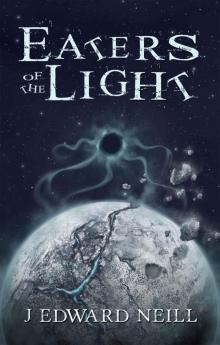 Eaters of the Light
Eaters of the Light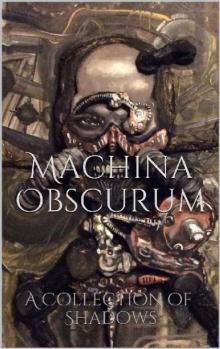 Machina Obscurum
Machina Obscurum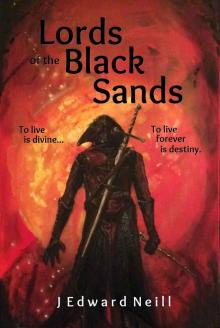 Lords of the Black Sands
Lords of the Black Sands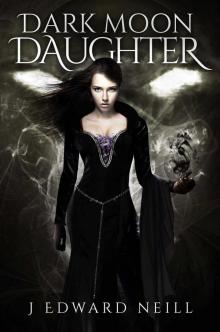 Dark Moon Daughter
Dark Moon Daughter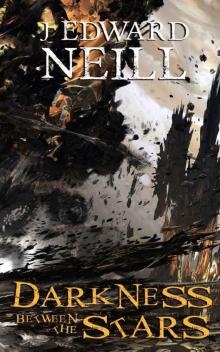 Darkness Between the Stars
Darkness Between the Stars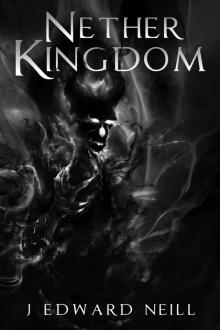 Nether Kingdom
Nether Kingdom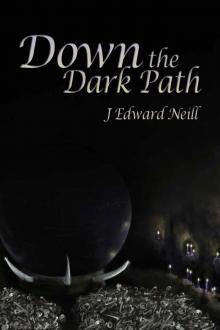 Down the Dark Path (Tyrants of the Dead Book 1)
Down the Dark Path (Tyrants of the Dead Book 1)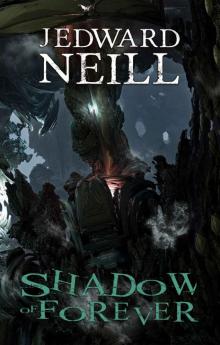 Shadow of Forever (Eaters of the Light Book 2)
Shadow of Forever (Eaters of the Light Book 2)